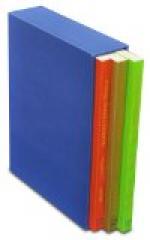[Illustration]
CHAPTER V
What uncle Harvey said about rain.
When the boys reached the house, Mr. Harvey was in his study. Samuel was anxious to ask him some questions about springs, but he would not go up stairs to disturb him. But after dinner his uncle came into the parlor where the boys were, and then Samuel asked him where all the water comes from that flows in the rivers and other streams.
“From the ocean,” answered Mr. Harvey. “I suppose you have seen water boiling, Samuel.”
“Yes, sir.”
“And have you seen the steam rise up from the water into the air?” Samuel said that he had. His uncle continued:
“Whenever water is heated, it is turned into steam, or vapor, as it is sometimes called. If there is enough of heat to make water boil, the vapor passes off very fast, until the water is gone. Now the sun is continually changing the water of rivers, ponds, lakes, and of the ocean, into vapor. This vapor rises. The air about a mile above the earth, is much colder than it is on the earth; so when the hot vapor from the ocean meets the cold air, it again becomes water, and forms clouds. I see you are ready with a question, John.”
“Yes, sir,” said John. “I cannot see, father, how the clouds can float in the air if they are nothing but water. Why do they not pour down?” His father answered:
“I expected this would be your question. The clouds, my son, are water, but not in a close mass, like that in a bucket or in the mill pond. You have seen soap bubbles, and know that a great many of them may be joined together without breaking. It is supposed by learned men, that clouds are nothing but many thousands of bubbles, which, being lighter than air, would, you know, float on it.”
“But, father,” said John, “what makes it rain?”
“That is not certainly known,” replied Mr. Harvey; “but, no doubt, lightning has much to do with it. I will show you, this evening, several pictures about clouds and springs of water, which will help you to understand what I have said.”
“Uncle,” said Samuel, “there is one more question which I would like to ask.”
“Ask it, my boy,” replied Mr. Harvey.
“I have read, sir, that the water of the ocean is salt; why, then, is not rain water salt, too?”
“Because,” said Mr. Harvey, “salt cannot be changed to vapor, and it is too heavy to be raised, in any quantity, in the air with the water. Yet, I suppose, that a little salt is always mixed with the bubbles that form clouds.”
CHAPTER VI.
How Thomas killed A hawk.
This afternoon was very hot, and the boys spent it in their room, arranging their books and pictures, and in reading. At five o’clock, while Thomas was standing by the window, he suddenly exclaimed: “There’s a hawk!” Both the boys ran to the window, and saw a large hawk, sailing slowly toward the barn.




